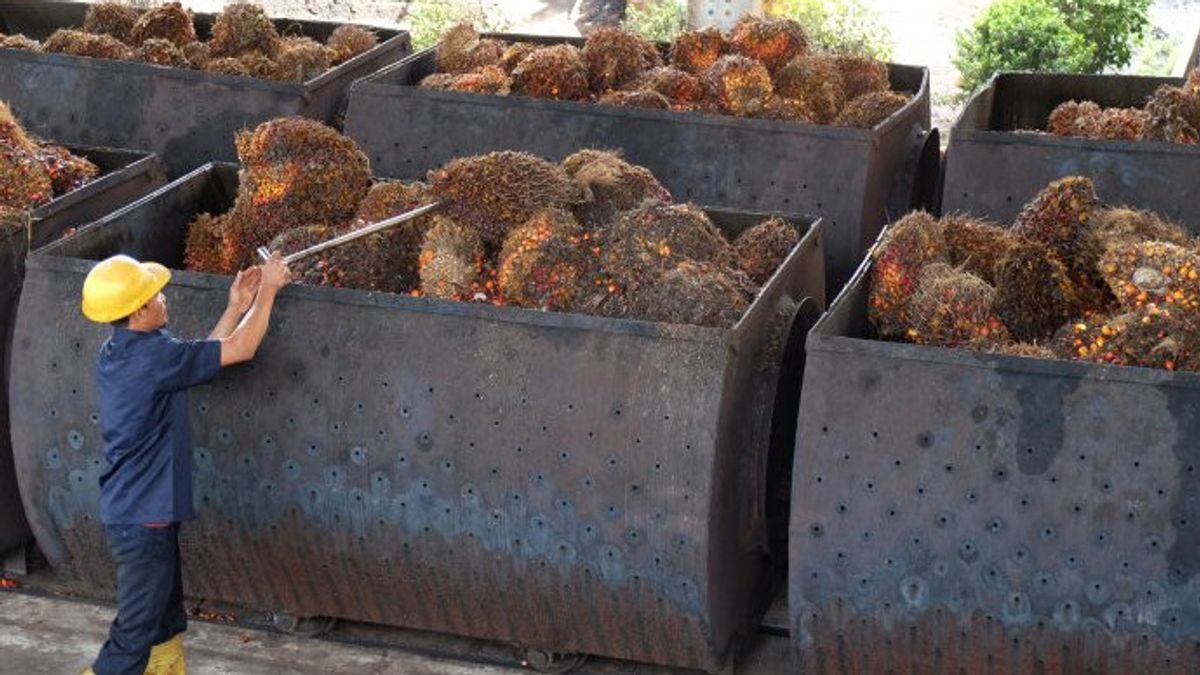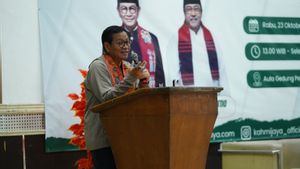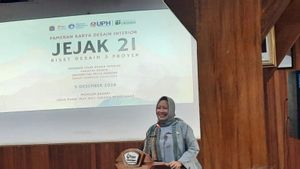JAKARTA - The price of crude palm oil (CPO) is estimated to remain high throughout 2022 or potentially around US$1,000 per tonne, although there is a potential for a decline compared to the record price set in 2021.
"We estimate that prices will remain high, but it does have an impact on the economy that must be faced. For example, if prices are high, the price of derivative products can also rise. Mothers must be prepared for the price of cooking oil to rise," explained the Deputy General Chairperson of the Indonesian Palm Oil Association. (GAPKI), Togar Sitanggang, at the Nusantara Sawit Sejahtera Public and Media Discussion on the Prospect of Palm Oil in 2022, online in Jakarta, Thursday 23 December.
In the same place, General Chairperson of the Indonesian Agricultural Economics Association (PERHEPI), Bustanul Arifin, said that in the past year the CPO price movement was not permanent. The price spike to $1,300 per tonne was driven by seasonal influences.
"The price in 2022 will still be above US$1,000 per ton. Could it be that Indonesia is the real market leader, not Rotterdam, although it must turn from biofuels first. The increase in CPO prices was also triggered by the biofuel policy," said Bustanul.
Bustanul emphasized that in 2022, the prospect of palm oil is still bright and CPO production will increase in line with the increase in consumption for food, industry and biofuel. However, there will be a new challenge next year, namely inflation, but the position of the palm oil industry remains bright.
Meanwhile, the Commissioner of PT Nusantara Sawit Sejahtera, Dr. Robiyanto, said the business prospect shows that there is still room to increase domestic consumption, especially from the population and the downstream industry in the country is also still very developed.
In addition to increasing domestic and global demand, the prospect for companies operating in the palm oil sector that remains consistent is the advantage that palm oil is the most stable and effective compared to other vegetable oils. The domestic downstream industry is also still very developed.
Robiyanto said that his party seized the opportunity to increase CPO prices since the beginning of the year and is expected to continue in 2022 to expand its business through an initial public offering (IPO). The IPO target is IDR 2 trillion, all of which will be used for business development, such as building factories and intensifying land and new planters.
PT Nusantara Sawit Sejahtera (NSS) is an oil palm plantation company established in 2008 in five plantation locations in Central Kalimantan. CPO production is 95,500 tons per year and the oil extraction rate (OER) from FFB reaches 22 percent.
NSS plans to hold an IPO in early 2022 to increase the company's business capacity and ensure that corporate governance becomes more accountable, transparent and upholds professionalism.
Meanwhile, Deputy Director of NSS, Kurniadi Patriawan, said that apart from benefiting, NSS is also committed to being responsible for the environment. In recent years, the NSS has applied many principles of sustainable development.
"We want to invite the community to prosper together, we don't want to go forward alone. The workforce prioritizes local residents in collaboration with regional universities. Technology transfers for cultivation and processing techniques that we have done. We will apply the same thing with core, plasma and independent smallholders that we can reach, so that their productivity and quality are the same," he explained.
NSS policy appreciationIn response to this commitment, the Government through the Ministry of Agriculture and GAPKI appreciates the commitment of PT Nusantara Sawit Sejahtera (NSS) to equalize the productivity of smallholder oil palm farmers, both those who are members of plasma farmer partnerships and farmers from residents around the company's operational locations.
The Coordinator of Palm Oil Substance at the Directorate General of Plantations at the Indonesian Ministry of Agriculture, Mula Putera, said that his party appreciates this commitment and if successful, it will be used as a pilot for partnerships between companies and smallholders.
"Of course this commitment, we appreciate from Nusantara Sawit Sejahtera, and if it can be a success, it can be a model that is used and replicated to other companies and partnerships. Moreover, the current choice is to intensify oil palm land because there is no new land," he explained. .
Mula said that next year, the prospect of the palm oil industry remains good, but it needs to be supported by productivity improvements. The policy is intensification because expansion is no longer available, so it needs company support.
"So around 44 percent are smallholder plantation farmers who still have the potential to increase their productivity. The government does have a budget and program for this. However, if they get support from the company, it will be greatly appreciated," he explained.
He said that for nucleus land and plasma land, it is common practice for companies to do this, but the big challenge is how to partner with independent smallholders who are widely scattered in oil palm production centers.
The English, Chinese, Japanese, Arabic, and French versions are automatically generated by the AI. So there may still be inaccuracies in translating, please always see Indonesian as our main language. (system supported by DigitalSiber.id)













